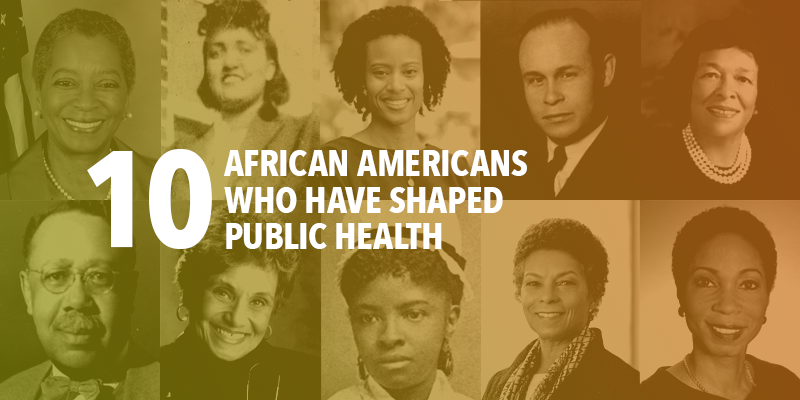Where We Work
See our interactive map


From one of Forbes's 100 Most Powerful Women to the father of the blood bank, black Americans have changed global health for us all.
We’re celebrating the legacies of ten African Americans in public health this month—shining a light on the invaluable contributions made by these scholars and health workers. According to the most recent report form the Health Resources and Services Administration, African Americans make up 11.6% of the US health workforce, and throughout American history have made invaluable contributions to greater public health in fields such as hematology, nursing, and microbiology.
Tragically, these accomplishments happened in a system which historically subjugated and exploited black Americans—and many individuals were denied access to the very systems and institutions that they helped improve.
African American History Month started with historian Dr. Carter G. Woodson, who worked to promote the study of African American history throughout his career. He lobbied to create Negro History Week in 1926, choosing February to align with the birth month of abolitionist Frederick Douglass and president Abraham Lincoln. Since 1976, the month of February has been designated as a time to honor and pay tribute to the role of African Americans in shaping American history and culture.
Donna M. Christensen was the first woman to represent the US Virgin Islands and the first female medical doctor in the House of Representatives. She chaired the Congressional Black Caucus’ Health Braintrust for 15 years, where she worked to address social determinants of health and tackle the HIV/AIDS threat both domestically and internationally.
Henrietta Lacks was a young mother when she was diagnosed with cervical cancer in 1951. When her cells were biopsied, it was revealed that unlike other samples, which died quickly leaving little time for close examination, Lacks’ cells multiplied every 20 to 24 hours. To this day, “HeLa” cells, named after her, are used to study cancer without experimenting on humans, leading to such advancement as the development of the polio vaccine.
Loyce Pace is president and executive director of Global Health Council. She is a multi-lingual policy and advocacy expert who has worked in several countries to further access to essential medicines and established the noncommunicable disease roundtable through Global Health Council.
Charles Drew was a pioneer in blood transfusion and the first African American to earn a medical doctorate from Columbia University. His research was instrumental in providing much-needed plasma to soldiers during World War II, and he is known as “the father of the blood bank” for his innovative mobile blood donation concept.
Roselyn Epps was the first African American national president of the American Medical Women’s Association. She is a dedicated maternal & child health and public health professional who has worked in smoking prevention and cancer research, and was Washington, DC’s first acting commissioner of public health.
William Hinton was a public health pioneer and Harvard University’s first black professor. A microbiologist and bacteriologist, he developed a test for syphilis, later dubbed the Hinton test, which greatly improved the accuracy and reliability of diagnosis of the infection.
Marilyn Hughes Gaston was the first African American woman to direct a public health service bureau in the United States. Her 1986 research led to a sickle-cell screening program for newborns, and under her leadership at the Bureau of Primary Health Care in the U.S. Health Resources and Services Administration, her sickle-cell research expanded internationally.
Mary Eliza Mahoney was the first African American licensed nurse and co-founder of the National Association of Colored Graduate Nurses. Her impeccable professional reputation and dedication to women’s rights contribute to her legacy.
Risa Lavizzo-Mourey was CEO of the Robert Wood Johnson Foundation for nearly 15 years, where she dedicated her tenure to building equity in communities and integrating health systems and services. She currently serves as professor of health policy and health equity at the University of Pennsylvania.
Helene D. Gayle has been named one of Forbes’ “100 Most Powerful Women,” and for good reason. As former CEO of CARE USA and during her 20-year tenure at the Centers for Disease Control, she leveraged her global development and humanitarian expertise to further programs on HIV/AIDS. She is the author of many articles on gender equity, social justice, and public health.
This is hardly an exhaustive list of all the contributions African Americans have made to bettering public health at home and abroad, and we ought to acknolwedge and highlight their influence all year long. We know that #28DaysAreNotEnough to properly pay homage to these and countless other individuals who have paved the way to greater health outcomes for us all.
Get the latest updates from the blog and eNews




